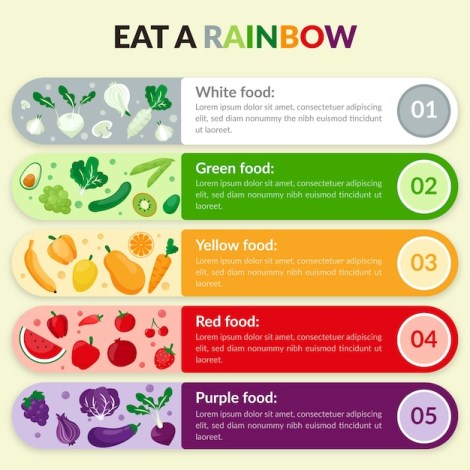

Eating vegetables is an essential part of a healthy diet.
Carrots are packed with vitamin A, which is great for improving eyesight.
Broccoli is a nutrient powerhouse, loaded with vitamins C, K, and E.
Spinach is not only a great source of iron but also helps in maintaining a healthy heart.
Sweet potatoes are rich in antioxidants and can help boost your immune system.
Tomatoes are technically a fruit, but we often treat them like vegetables in cooking.
Cucumbers are 95% water, making them a hydrating and refreshing snack.
Eating a variety of colorful vegetables ensures you get a wide range of nutrients.
Artichokes contain compounds that aid digestion and promote liver health.
Asparagus is a natural diuretic and is great for detoxification.
Bell peppers are a great source of vitamin C, even more than oranges.
Beets contain nitrate, which helps in reducing blood pressure.
Cauliflower can be used as a low-carb alternative for rice or pizza crust.
Onions have antibacterial properties and can help fight infections.
Kale is incredibly nutrient-dense and provides excellent health benefits.
Radishes are a root vegetable that adds crunch and flavor to salads.
Peas are a good source of plant-based protein and fiber.
Eggplants are rich in antioxidants and can help protect against certain diseases.
Vegetables like cabbage and Brussels sprouts belong to the cruciferous family, known for their cancer-fighting properties.
Mushrooms are technically fungi but are often used as vegetables due to their versatility in cooking.
Zucchini is a low-calorie vegetable that can be spiralized into noodles for a healthy pasta alternative.
Eating a plant-based diet that includes plenty of vegetables can reduce the risk of chronic diseases.
Some vegetables, like arugula and watercress, are known as superfoods due to their high concentration of nutrients.
Celery is a low-calorie vegetable that requires more energy to digest than it provides, making it a good choice for weight management.
Corn is a popular vegetable, especially during the summer months when it’s in season.
Vegetables grown organically without the use of pesticides are the healthiest choice.
Adding vegetables to your meals can help you feel fuller for longer and aid in weight loss efforts.
Garlic provides numerous health benefits, including boosting the immune system and reducing the risk of heart disease.
Adding vegetables like spinach or kale to your smoothies can increase their nutritional value.
Avocados are technically fruits, but they are often classified as vegetables due to their culinary uses.
Green beans are a good source of fiber, which can support digestive health.
Cauliflower can be roasted and seasoned to create a tasty, low-carb alternative for buffalo wings.
Adding grated zucchini or carrots to baked goods can increase their moisture and nutritional value.
Eating a variety of vegetables can improve gut health and promote a strong immune system.
Vegetables can be grilled, roasted, steamed, or eaten raw – there are endless ways to enjoy them!
Some vegetables, like onions and garlic, provide prebiotics that nourish our gut bacteria.
Eating vegetables can improve skin health and give you a natural glow.
Incorporating vegetables like spinach or kale into your breakfast smoothies can help increase your daily intake of vitamins and minerals.
Some vegetables, like ginger or turmeric, have powerful anti-inflammatory properties.
Roasted Brussels sprouts make a delicious and nutritious side dish for any meal.
Adding vegetables like cauliflower or carrots to soups and stews can increase their nutritional value.
Eating a rainbow of vegetables ensures you get a wide range of antioxidants and phytonutrients.
Vegetables like radishes or beetroot can add vibrant colors to your salads.
Some vegetables, like bok choy or Swiss chard, are packed with calcium, essential for strong bones.
Don’t forget to enjoy the beauty of vegetable gardens and farms – they are a source of inspiration and connection with nature.
Around the world, coffee enthusiasts enjoy Monin coffee concentrate since it is a multipurpose product. Conveniently combining…
The Importance of Choosing the Right Shower for Your Bathroom Renovating your bathroom can be…
Usain Bolt holds the record for the fastest 100-meter sprint in history.Bolt was named Sportsman…
Love is in the air... and it smells suspiciously like chocolate!Roses are red, violets are…
Life's a beach, take a picture and relax.Sun, sand, and salty kisses. That's what beach…
Hungary is home to the largest thermal water cave system in the world.The Rubik's Cube…